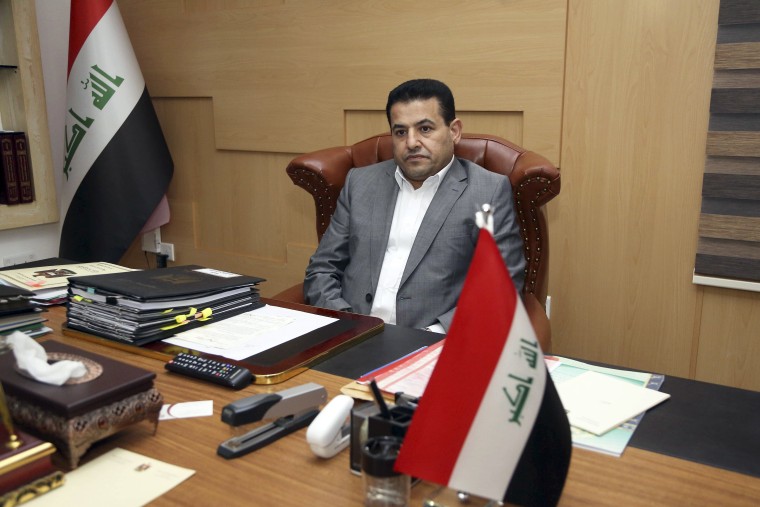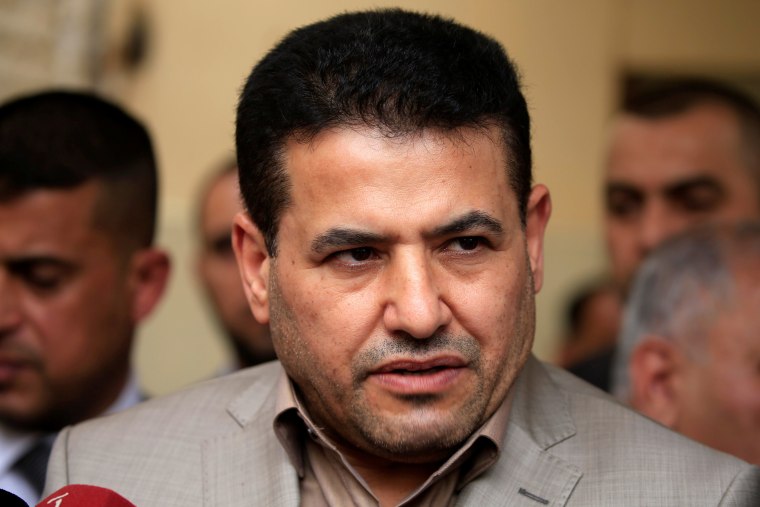BAGHDAD — Just over 10 years ago, Qasim al-Araji was being arrested a second time by American forces in Iraq. The charges were serious: smuggling arms used to attack U.S. troops and involvement in an assassination cell at the height of sectarian violence that engulfed Iraq following the 2003 toppling of Saddam Hussein.
Now, he heads of one of Iraq's most powerful ministries.

With credentials that include training from Iranian special operators known as the Quds force and time spent as a guerrilla and militia commander, Iraq's Interior Minister al-Araji is now trumpeting his respect for human rights and support for the U.S.-led coalition in the fight against ISIS. But the forces he now commands have a long history of Shiite domination and abuse, factors that partially contributed to the rise in support for ISIS in Iraq.
Back in 2007, al-Araji was held by the United States for 23 months. He spent most of his captivity at Bucca prison, including long periods in solitary confinement.
Today, at the head of one of Iraq's most powerful ministries, al-Araji laughs off questions about lingering hostility toward U.S. forces.
"The Americans didn't understand, we were both working for the same end"
"That's life," he said in a recent interview with The Associated Press, his manner boisterous and unpolished as he shuttled between meetings at a small Interior Ministry office inside Baghdad's highly fortified Green Zone. "I was their prisoner and now I meet with their ambassador."
Al-Araji's office confirmed that he met with the U.S. ambassador to Iraq within days of taking office to express his support for the U.S. role in the fight against ISIS and to request additional support for his ministry and forces.
Following a controversial March 17 strike in Mosul that killed more than 100 civilians, al-Araji took a rare public position for an Iraqi politician: he defended the U.S.-led coalition and the use of airstrikes in Mosul on the floor of Iraq's parliament.
"My most important goal is to bring security to Iraq," al-Araji said, "and (to achieve that) Iraq is in need of the friendship of the Americans."
Al-Araji, who spent years in exile in Iran, first traveled there as a teenager in the 1980s and was trained by Iranian special forces as a guerrilla fighter to resist Saddam Hussein's regime. In the Iran-Iraq war, he fought on Iran's side. Al-Araji describes his years in Iran as a fighter as formative.
After the fall of Baghdad in 2003, al-Araji and thousands of other fighters poured across the border into Iraq.
"We didn't have any military activities," he said of his first days back in Iraq, "but we were supporting the overthrow of the regime. The Americans didn't understand, we were both working for the same end."
On April 19 that year he was arrested by U.S. forces on suspicion of commanding militia forces, held for 85 days and then released on insufficient evidence. In 2004, following the fall of Saddam, al-Araji said he fully transitioned to politics, running for local office in Baghdad's Wasit province.
But three years later he was arrested again by U.S. forces. A secret cable from the U.S. Embassy in Baghdad on Jan. 19, 2007 published by WikiLeaks stated that U.S. forces "had good information based on multiple sources," that al-Araji was "involved in smuggling and distribution" of explosives that were being used to target U.S. forces and that he was "also suspected in involvement in an assassination cell."
After nearly two years, al-Araji was again released on insufficient evidence.
Al-Araji — who was appointed in January — takes over the ministry at a critical time for the country's security forces who are under increasing pressure to eliminate the last pockets of ISIS control, prevent an insurgency from bubbling up in the wake of territorial victories, and repair their reputation in Iraq's Sunni heartland.
British Ambassador to Iraq Frank Baker told the AP he talks to al-Araji regularly. He described him as an "an Iraqi patriot" who "faces many challenges but is doing a very good job for Iraq and the Iraqi people."
